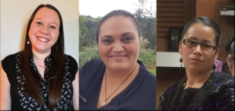-
The Resurgence of Indigenous Midwifery in Canada, New Zealand, and Mexico
October 16, 2020 By Hannah Chosid Globally, Indigenous women experience worse maternal health outcomes than non-Indigenous women. In the United States, the risk of maternal death is twice as high for Native women than for white women, while in Australia the risk is four and a half times higher. This week’s Friday Podcast highlights remarks from a recent Wilson Center event with the United Nations Population Fund (UNFPA) and the International Confederation of Midwives about Indigenous midwifery.
Globally, Indigenous women experience worse maternal health outcomes than non-Indigenous women. In the United States, the risk of maternal death is twice as high for Native women than for white women, while in Australia the risk is four and a half times higher. This week’s Friday Podcast highlights remarks from a recent Wilson Center event with the United Nations Population Fund (UNFPA) and the International Confederation of Midwives about Indigenous midwifery.Globally, Indigenous women experience worse maternal health outcomes than non-Indigenous women. In the United States, the risk of maternal death is twice as high for Native women than for white women, while in Australia the risk is four and a half times higher. This week’s edition of Friday Podcasts highlights remarks from a recent Wilson Center event with the United Nations Population Fund (UNFPA) and the International Confederation of Midwives about Indigenous midwifery.
“The decline of Indigenous midwifery really happened through the outlawing and the denigration of Indigenous midwifery, and was an attack on our Indigenous knowledge systems, our ways of being, our ceremonies and our practices,” said Claire Dion Fletcher, an Indigenous Potawatomi-Lenape Registered Midwife and co-chair of the National Aboriginal Council of Midwives. “The control of Indigenous women through the, at times, violent control of our reproduction was and continues to be a tool of colonization.”
“In the 19th century with the medicalization of birth, there was a decline of midwifery in Canada, almost to the point of non-existence,” said Fletcher. Yet Indigenous women still wanted to have traditional births according to their customs and knowledge. “The Inuit women in Nunavik wanted Inuit midwives,” she said. “They wanted to give birth in their communities with their families surrounded by their knowledge and their teachings.” To this day, the resulting community-driven Inuit midwifery program has some of the “best health outcomes in the world,” said Fletcher.
Similarly, colonization played a key role in the decline of Indigenous midwifery in New Zealand, said Nicole Pihema, Māori Registered Midwife and President of the New Zealand College of Midwives. In New Zealand in 1840, British colonizers and Māori leaders signed a document intended to ensure that the British would not interfere in Māori life, said Pihema. But instead, the colonial government continued to interfere in Māori life by passing harmful legislation including the Tohunga Suppression Act of 1907, which led to the desecration of Māori midwifery practices. However, there is a resurgence within Māori midwifery to try to rediscover traditional practices, said Pihema. This resurgence requires a commitment to normalizing inclusive language, “because you can teach cultural competency all you want, but you’re never [going to] get it unless you know the language,” she said.
“In Mexico, midwifery has existed even before we were colonized by the Europeans,” said Ofelia Pérez Ruiz (through a translator), an Indigenous Registered Midwife and spokesperson for the Chiapas Nich Ixim Movement of Traditional Midwives. “And traditional midwifery in Mexico has been here despite criminalization and going through exclusion policies,” she said. In Mexico, Indigenous midwives are not included in conversations about maternal health. “They [doctors and health institutions] don’t take us into account as part of the maternal and neonatal care,” said Pérez Ruiz. “We want to have a relationship with health institutions, but based on respect. We wanted to work along and hand in hand with the doctors using those skills and knowledge of all of us as a team … so that indigenous women will receive a timely care and respectful care during their pregnancy, birth, and after birth.”
Friday Podcasts are also available for download on iTunes and Google Podcasts.
Sources: Formación y Capacitación A.C., Centers for Disease Control and Prevention, International Confederation of Midwives, National Aboriginal Council of Midwives, New Zealand College of Midwives, UNFPA
 A Publication of the Stimson Center.
A Publication of the Stimson Center.

 Globally, Indigenous women experience worse maternal health outcomes than non-Indigenous women. In the United States, the risk of maternal death is
Globally, Indigenous women experience worse maternal health outcomes than non-Indigenous women. In the United States, the risk of maternal death is 

